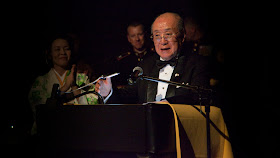 |
| Photo taken by my friend Rachel |
Unlike other balls we have been to, especially that in the gorgeous Destin, Florida, the audio-visuals were fabulous. Usually we can;t see or hear the commandant's annual message to the Marines (pre-recorded and mass produced), but with the six screens and excellent sound system, that was not a problem this year. In fact, the lighting system was hung by the ceiling on a star-shaped frame and the disco ball was actually a 3-foot-tall Marine Corps emblem. I heard several (drunk) marines shout, "That's the best disco ball EVER!" I'd have to say I agree.
 |
| This is the best I could do with my iPhone. It really doesn't do the disco ball justice. |
 |
| The dance floor after the ceremony and dinner. |
 |
| Photo courtesy of Will Guthrie ;) |
 |
| At our assigned table. Photo courtesy of Rachel. |
1) There will be a pageant of uniforms showcasing the styles and weapons through history.
2) There is a huge birthday cake, and symbolically, one piece is cut and shared by the oldest and youngest active duty Marines present.
3) There is an empty table, set to the side of the stage, with a black table cloth and an inverted place setting as a tribute to fallen Marines.
4) There is a guest speaker of some merit, usually a retired, high-ranking Marine.
Let's go through these traditions one at a time...
1) Yes, there was a pageant of uniforms, but I did not get photos because my iPhone wouldn't take any decent ones. If you are interested in seeing what I am talking about, this YouTube video does a pretty good job.
2) Yes, there was a huge birthday cake, and yes, the oldest (born in 1962) and youngest (born in 1993) shared the first piece.
 |
| The cake |
 |
| The oldest and youngest Marines present. |
4) Yes, there was a guest speaker. First, the commanding officer of the base, Col. Stewart (seen below on the left) said a few words. Then he introduced the guest speaker, who was not the typical retired U.S. Marine I was expecting. Mr. Masayuki Matsumuro (on the right in the photo below) was actually a member of the Japanese Navy Air Fleet during World War II.
 |
| During the cake ceremony |
 |
| Col. Stewart |
 |
| Mr. Matsumuro |
Mr. Matsumuro, a funny and compelling speaker, helped me to understand. He was born in Hiroshima in 1929 and joined the Japanese Navy Air Fleet in 1944, at the age of 15. He served in the Special Attack Corps, where less than 10 percent of pilots were expected to survive the war. In fact, Mr. Matsumuro was visiting his home town of Hiroshima in early August 1945, saying his final good-byes to his family before he headed out on his first mission. His train left to take him back to his base at 6 a.m. the morning the bomb was dropped on Hiroshima at 8:15 a.m. While he, obviously, survived, he lost his home and every member of his family that day. In his speech, Mr. Matsumuro said that he developed a deep hatred for America that day, and who could blame him?
Yet, today, he is a huge advocate of the Japanese-American alliance and friendship. Why? Because of the actions of a single American soldier. Shortly after the war ended, Mr. Matsumuro went back and finished high school and went on to continue his studies at the specialized Osaka Foreign Affairs School. Meanwhile, he met his future wife, and, one day, they were traveling together on a train when they encountered a drunk American soldier. The soldier started harassing Mr. Matsumuro's fiancee. When the soldier got off at a stop, Mr. Matsumuro followed him and pushed him in to a canal. Mr. Matsumuro was subsequently arrested. He said, at the time, he was surprised that he got an attorney, decent treatment and a fair trial. In post-war Japan, whatever Americans said was what was considered the truth. In fact, the soldier who had started the trouble was present at the trial to present his side of the story. Mr. Matsumuro was shocked when the soldier told the truth about his behavior to the court, setting Mr. Matsumuro free. In his speech, Mr. Matsumuro said that the honesty of the U.S. soldier completely changed his mind about Americans and the future of the two countries' alliance. In fact, shortly afterward, he traveled to the states and graduated from Cal State Sacramento with a bachelor's degree in geography, returning to Japan in 1953, where he had an incredibly successful career in business.
In his speech, Mr. Matsumuro said that he and the unnamed American soldier remained friends until the soldier's death a few years ago. In fact, the soldier sponsored Mr. Matsumuro's children when they attended college in the soldier's home state of Texas.
Mr. Matsumuro's story is one that I have taken to heart. It is evidence that just one ordinary person can make an impact on the future of something so much larger. I am reminded that every time I leave my house, and especially the base, that I represent America, and my behavior determines if the Japanese see the best or worst of my country. Mr. Matsumuro saw both, but chose to remember the best. I really hope that others on base remember that, too.

No comments:
Post a Comment